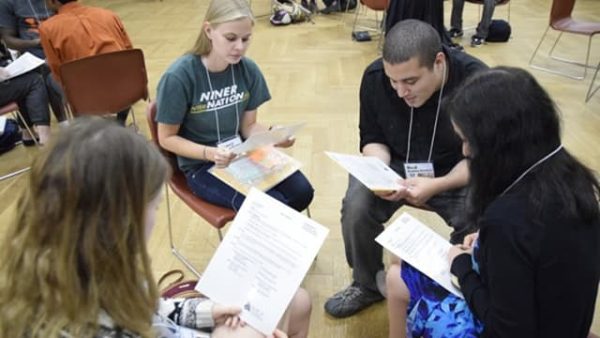Students learn about poverty, language issues through simulation

Sixty UNC Charlotte students who are enrolled in Spanish language classes caught a glimpse of what it means to live in poverty in a foreign country, struggling to survive with limited language skills.
During the poverty simulation, conducted in partnership with Crisis Assistance Ministry, the students were organized into “family” groups of three to six people with specific background stories and roles. They could only speak Spanish during the simulation and had to complete tasks while overcoming obstacles.
“One outcome of this simulation was for students to understand how the language barrier feels for those for whom English is not their first language,” said Susana Cisneros, a Spanish lecturer in the Department of Languages and Culture Studies who organized the simulation. “They were stressed and frustrated because they were not able to express themselves. I think that they learned that understanding the language and appreciating the culture are important. Also, some of they realized how much they know about the conjugation and vocabulary but realized how hard is to put the language together on the spot in real-life situations.”
Gina Esquivel, associate director of programs, education and civic engagement at Crisis Assistance Ministry, said, “One of the big things about living in poverty is how time becomes an asset and if you don’t have it, you struggle with making every day happen. How you actually run out of time or don’t have enough time to spend with your family, to build relationships with your family, to connect with your neighbors, to connect with your coworkers, to the extent that you’d not actually have enough time to think about your health or to balance your checkbook.
“It is hard when you do not speak the language because you don’t know what resources are available or where to go to obtain them and you are much more easily taken advantage of,” Esquivel said. “A lot of people could not say what they needed. A basic need is being able to communicate. If you cannot communicate, then you become very isolated.”
For the simulations, close to two dozen Spanish speakers volunteered to act as members of the community, representing a bank, health care center, pawn shop, employment office, police department, supermarket, social services, clothing shop, loan company, child care, public school, mortgage company and family resource center.
Each of the “families” had a list of responsibilities to complete, such as paying bills, finding jobs, sending their children to school, finding transportation, buying food and clothing, and managing critical situations. To further complicate every circumstance, once the simulation began, no one was allowed to speak English.
Midway through the simulation, some family members lost their jobs or were evicted from their homes. They went to jail and saw their children taken from their custody. In their roles, the students ran around frantically trying to resolve their issues. Some resorted to selling their belongings and even stealing from other families and businesses in order to make ends meet.
After the simulation, the students and volunteers gathered to talk about their individual experiences and how it affected them personally.
“Who had time to spend with their children?” Esquivel asked the students. “Or had time to tutor them and to sit down and help them with their homework? Did you have time to go to the doctor, the park or to school?” No one raised a hand.
Students reported that among the greatest challenges were the language barrier and the different treatment they experienced because they could not communicate. One student who is a first-generation American shared that the simulation put into perspective the struggles her parents had experienced.
Esquivel encouraged participants to do something to help their communities. “You have the privilege today to leave the simulation and live your own life,” she said. “People living in poverty cannot check out and what you all experienced tonight, the chaos, frustration, and lack of time, people have to live that every day.”
Photo by Edwin Davila